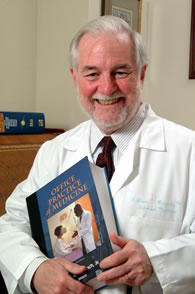News Release: Research, School of Medicine
Jan. 26, 2009
Doctors Express Humane Care with Fine-Tuned Training
 William T. Branch Jr., MD
William T. Branch Jr., MDResearchers have found that a method of training doctors to be humanistic is achievable and results in a higher level of communication between doctor and patient. The study was reported in the January 2009 issue of Academic Medicine.
The researchers defined humanism as a belief system where human interests, values and dignity are a high priority. These actions support a patient-centered humane care that is respectful of and responsive to patients' needs, values and concerns.
Faculty development programs were designed and implemented at five medical schools, and then determined whether or not faculty participants were perceived to be more effective humanistic teachers. The study was conducted at five medical schools – Emory University School of Medicine, Indiana University School of Medicine, the University of Rochester School of Medicine, Baylor College of Medicine and the University of Minnesota Medical School.
"Our goal with the study was to determine if fine-tuning processes to develop humanistic, or compassionate and skillful communicators, would achieve this outcome," says lead author and principle investigator William T. Branch Jr., MD, Carter Smith, Sr. Professor and director, Division of General Internal Medicine, Emory University School of Medicine. “On the basis of the results from this study, we predict that favorable changes in the informal curriculum can be achieved by developing teachers who are more caring persons and clearly connect with and inspire others.”
The report says that humanism and professionalism have long been emphasized in medical education. Efforts have been redoubled in the past 10 years, say the authors.
In 1999, the Accreditation Council for Graduate Medical Education announced required competencies in professionalism, compassionate care and humanistic values. All accredited residency programs are now held accountable.
In the new study, promising teachers were chosen from volunteers to participate in groups at each of the medical schools. Between September 2004 and September 2006, the facilitators jointly designed and implemented a curriculum for enhancing humanistic teaching using previously defined learning goals that combined experiential learning of skills with reflective exploration of values.
Twenty-nine participants from the five schools were compared with 47 controls drawn from the same schools in the final six months of the two-year project. For comparison, the authors developed a 10-item questionnaire, the Humanistic Teaching Practices Effectiveness Questionnaire (HTPE), to be filled out by medical students and residents taught by participants or control faculty. Items were designed to measure previously identified themes and domains of humanism.
The participants who had completed the programs outperformed their peers who did not participate on all 10 items of the HTPE questionnaire.
"These results were statistically significant and sufficiently robust to suggest practical importance," says Branch. "A longitudinal faculty development process that combines experiential learning of skills and reflective exploration of values in the setting of a supportive group process was successfully accomplished and had a positive impact on participants’ humanistic teaching."
Other authors of the study, which was funded by the Arthur Vining Davis Foundations, are Richard Frankel, Ph.D. of Indiana University School of Medicine; Catherine F. Gracey, M.D., of the University of Rochester; Paul M. Haidet, M.D., M.P.H., of Baylor College of Medicine; Peter F. Weissmann, M.D., of the University of Minnesota Medical School; Paul Cantey, M.D, M.P.H., formerly of Emory and now of the Centers for Disease Control and Prevention; Gary A. Mitchell, M.D., formerly at the IU School of Medicine, now with the American University of the Caribbean School of Medicine; and Thomas S. Inui, MD, ScM, Indiana University School of Medicine and the Regenstrief Institute.
###
The Robert W. Woodruff Health Sciences Center of Emory University is an academic health science and service center focused on missions of teaching, research, health care and public service. Its components include schools of medicine, nursing, and public health; Yerkes National Primate Research Center; the Emory Winship Cancer Institute; and Emory Healthcare, the largest, most comprehensive health system in Georgia. The Woodruff Health Sciences Center has a $2.3 billion budget, 17,000 employees, 2,300 full-time and 1,900 affiliated faculty, 4,300 students and trainees, and a $4.9 billion economic impact on metro Atlanta.
Learn more about Emory’s health sciences:
Blog: http://emoryhealthblog.com
Twitter: @emoryhealthsci
Web: http://emoryhealthsciences.org
